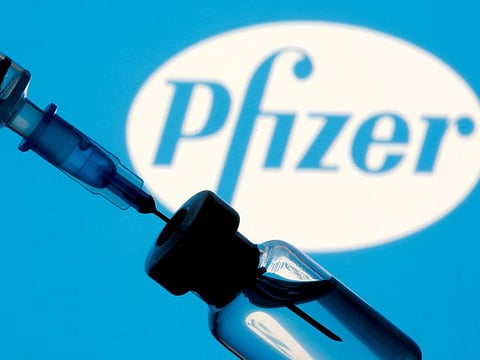Spacing Pfizer COVID-19 shots boosts antibody levels after initial drop: Study
Australia approves Pfizer jab for 12 to 15-year-olds

London: A longer gap between doses of Pfizer’s COVID-19 vaccine leads to higher overall antibody levels than a shorter gap, a British study found on Friday, but there is a sharp drop in antibody levels after the first dose.
The study might help inform vaccination strategies against the Delta variant, which reduces the effectiveness of a first dose of COVID-19 vaccine even though two doses are still protective.
“For the longer dosing interval ... neutralising antibody levels against the Delta variant were poorly induced after a single dose, and not maintained during the interval before the second dose,” the authors of the study, which is being led by the University of Oxford, said.
“Following two vaccine doses, neutralising antibody levels were twice as high after the longer dosing interval compared with the shorter dosing interval.” Neutralising antibodies are thought play an important role in immunity against the coronavirus, but not the whole picture, with T cells also playing a part.
The study found overall T cell levels were 1.6 times lower with a long gap compared with the short dosing schedule of 3-4 weeks, but that a higher proportion were “helper” T cells with the long gap, which support long-term immune memory.
The authors emphasised that either dosing schedule produced a strong antibody and T cell response in the study of 503 healthcare workers.
Durable immunity
The findings, issued as a pre-print, support the view that while a second dose is needed to provide full protection against Delta, delaying that dose might provide more durable immunity, even if that’s at the cost of protection in the short-term.
Last December, Britain extended the interval between vaccine doses to 12 weeks, although Pfizer warned there was no evidence to support a move away from a three-week gap.
Britain now recommends an 8-week gap between vaccine doses to give more people high protection against Delta more quickly, while still maximising immune responses in the longer term.
“I think the 8 week is about the sweet spot,” Susanna Dunachie, joint chief investigator on the study, told reporters.
Pfizer’s COVID shot approve for use with 12 to 15-year-olds
Meanwhile, Australia’s drug regulator has approved Pfizer’s COVID-19 vaccine for use with 12 to 15-year-olds, Federal Health Minister Greg Hunt said on Friday, as the country fights an outbreak of the Delta variant in three states.
The Therapeutic Goods Administration has thoroughly assessed the domestic and international evidence before extending its approval for the Pfizer vaccine to be administered to this age group, Hunt said in a statement.
Similar clearances for the use of the vaccine in children were approved several weeks ago by regulators in the United States, European Union and Britain.
Up until now, the Pfizer vaccine had only been approved for use in Australia for people aged 16 years and over.
Australia’s vaccination panel will advise on which groups of children should be prioritised for the rollout of the vaccine and when it should be administered, Hunt said.
With just over 32,400 COVID-19 cases and 915 deaths, Australia has handled the pandemic much better than many other developed economies, but stop-and-start lockdowns and a sluggish vaccine rollout have led to frustration.
Prime Minister Scott Morrison on Thursday apologised for the slow vaccination programme as his government looks to speed up inoculations and meet a target to vaccinate the adult population by end-2021.
So far, just under 15% of the adult population has been fully vaccinated.
Pfizer shot just 39% effective in halting Delta, Israel says
In Israel, the country’s health ministry said Pfizer vaccine was just 39% effective in keeping people from getting infected by the contagious delta variant in Israel in recent weeks, but provided a strong shield against hospitalisation and more severe forms of the virus.
The vaccine provided 88% protection against hospitalisation and 91.4% against severe illness for an unspecified number of people studied between June 20 and July 17, according to a report from the health ministry.
The report said that the data could be skewed because of different ways of testing vaccinated groups of people versus those who hadn’t been inoculated.
The delta variant first emerged in India and is spreading around the globe as governments race to inoculate people, sometimes infecting those already fully vaccinated against Covid. The mutation has forced some countries to delay or rethink plans to loosen curbs on businesses, activity and travel.
Israel has had one of the world’s most effective inoculation drives, with 57% of the population fully vaccinated, but has seen a recent surge in infections due to delta. Critical cases have also climbed, but remain a fraction of the peak earlier this year.
Prime Minister Naftali Bennett has urged vaccine holdouts - who number some 1.1 million people - to get inoculated, calling it the most effective way to defeat the delta strain. The government has also reinstated some restrictions for indoor events and plans to ban flights to several countries with rising infection rates, including the UK and Cyprus.








